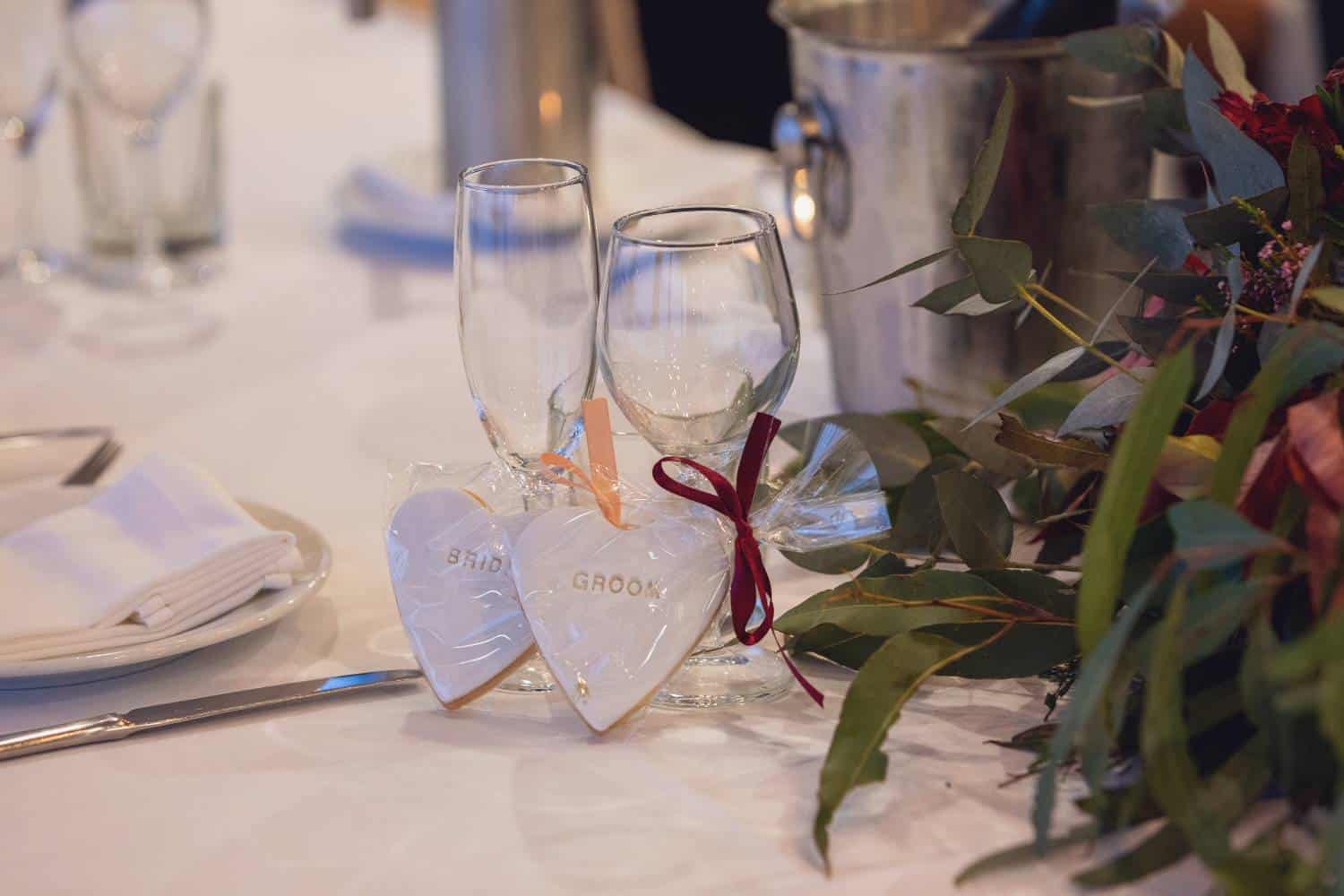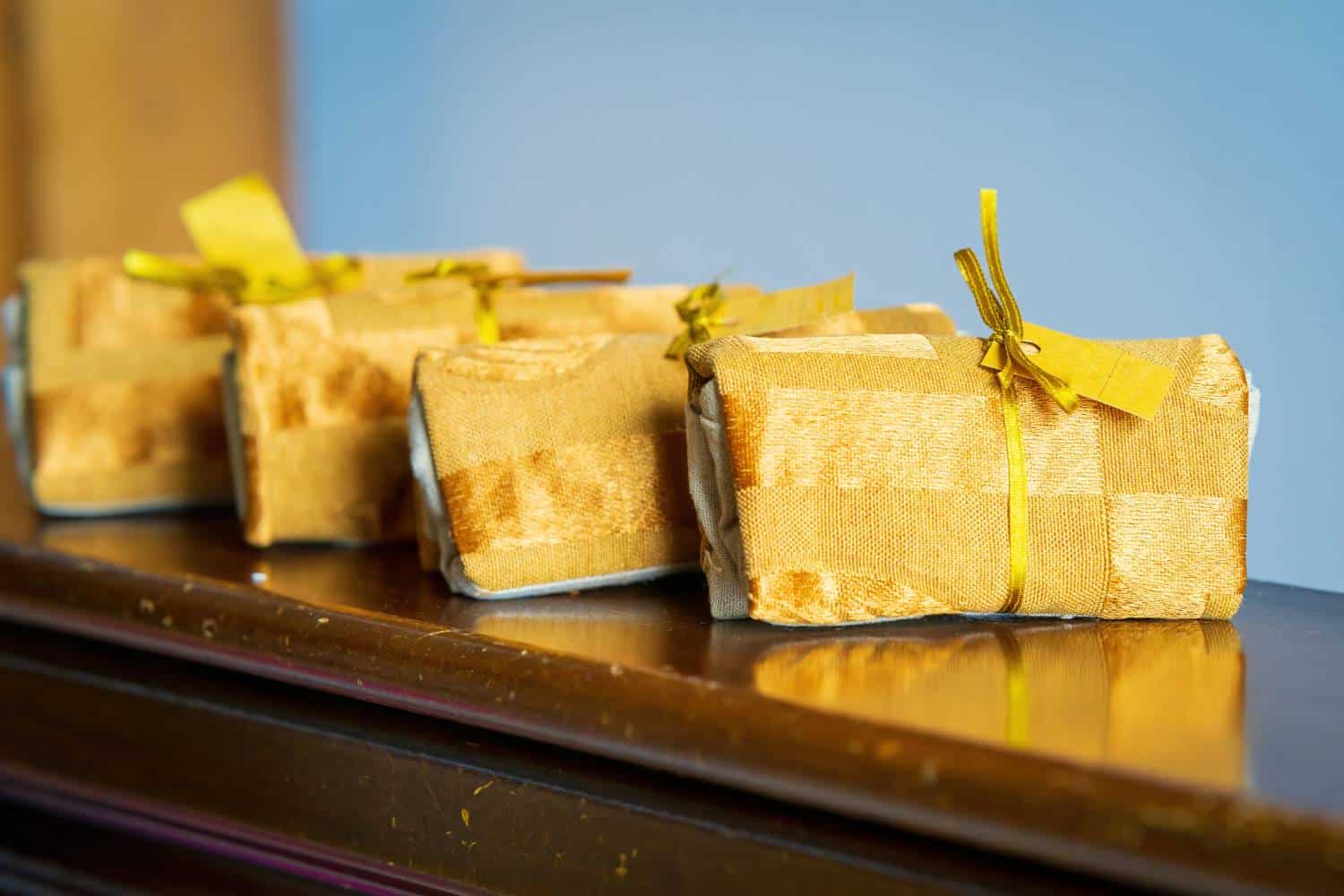When planning a wedding, couples are often faced with the decision of whether to provide wedding favours. While some may consider them an unnecessary expense, others view them as a thoughtful and traditional gesture.
To help you decide if wedding favours are right for your celebration, we’ll discuss the advantages and disadvantages, alternative options, and key questions to consider.
Let’s get straight to the point
Wedding favours are a personal choice and can be a nice gesture of gratitude, honour tradition, and offer personalised keepsakes. However, they can also add unnecessary costs and often go unused, creating waste.
Alternatives like charitable donations, welcome bags, handwritten thank-you notes, or photo booth prints can be more practical and memorable.
When deciding, consider your budget, priorities, and whether your guests will truly appreciate the favours. Ultimately, it’s about making a choice that fits your vision for the day.
Pros Of Wedding Favours
Although wedding favours may seem like a small detail, they do offer several benefits that can enhance your wedding experience. Here are the main advantages of providing favours:
1. A Small Gesture Of Gratitude
One of the primary reasons to provide wedding favours is to show your appreciation to your guests.
Many of them may have travelled long distances or rearranged their schedules to celebrate with you.
A small token, such as a personalised chocolate or keepsake, is a simple yet effective way to thank them for their effort and presence.
- Key point: It’s a gesture of gratitude that acknowledges your guests’ time and effort.
- Example: Personalised chocolates, mini champagne bottles, or custom keychains.
2. Tradition
For couples who value tradition, wedding favours can be an essential part of the day. The custom of giving favours, particularly in European weddings, dates back centuries and symbolises good fortune.
By including favours, you honour this longstanding tradition, adding a sense of timelessness and continuity to your celebration.
- Key point: Wedding favours are a time-honoured tradition, symbolising luck and gratitude.
- Example: Sugared almonds, a classic European wedding favour symbolising health, wealth, and happiness.
3. Personalisation
Favours are a great opportunity to infuse your personality into the event. Whether you and your partner are passionate about a particular hobby, food, or music, you can share that interest with your guests.
Personalising favours makes them unique to your wedding, and this thoughtful touch can resonate with your guests.
- Key point: Favours can be personalised to reflect the couple’s personality and interests.
- Example: A favourite snack, a small jar of local honey, or a playlist of your favourite songs on a USB drive.
4. Memorable Keepsakes
A well-chosen favour can serve as a lasting memento of your wedding. Practical items like engraved bottle openers or mini photo frames with a wedding photo can be cherished by guests for years.
These keepsakes offer a reminder of the special day and the role your guests played in it.
- Key point: Favours can act as long-lasting keepsakes for your guests.
- Example: Custom coasters, a small plant, or a framed wedding photo.
Cons Of Wedding Favours
While there are clear benefits to providing wedding favours, there are also a number of reasons why they might not be necessary for every couple. Below are the key arguments against them:
1. Extra Expense
Weddings are already costly events, and adding favours to the list of expenses can push the budget even higher. A seemingly small amount, such as $3 per guest, can add up quickly when you have a large guest list.
For example, 100 guests mean an additional $300, which might be better spent on more memorable aspects of the day, like food or entertainment.
- Key point: Wedding favours can add significant costs to an already expensive event.
- Example: A couple might spend hundreds of dollars on favours that guests may not use or remember.
2. Waste
Unfortunately, many wedding favours end up left behind or discarded after the event.
Items like personalised keychains, candles, or mini bottles of liquor may seem like thoughtful gifts, but they aren’t always appreciated or used.
This can result in a lot of waste, both in terms of money and materials, contributing to environmental concerns.
- Key point: Many favours are often left behind or thrown away, creating waste.
- Example: A personalised candle might not fit a guest’s taste or decor and thus gets discarded.
3. Not A Priority
In the grand scheme of wedding planning, favours might not rank as a high priority for couples.
Most guests remember the food, venue, and the overall experience of the wedding rather than the small token they took home.
If you’re stretched for time or resources, it might make more sense to skip the favours and allocate those funds elsewhere.
- Key point: Wedding favours are often not a top priority for couples or guests.
- Example: Allocating funds towards a live band, catering upgrades, or a wedding photographer.
Alternatives To Wedding Favours
If you’re unsure about traditional wedding favours, there are plenty of alternatives that still allow you to show your appreciation without the added cost or waste. Here are some creative options:
1. Charitable Donations
Instead of physical favours, some couples choose to make a charitable donation in their guests’ names.
This trend is gaining popularity, as it allows you to give back to a cause that’s meaningful to you and your partner.
Whether it’s a local organisation or an international charity, this thoughtful gesture can resonate with guests while making a positive impact.
- Key point: A charitable donation is a meaningful and socially conscious alternative.
- Example: Donations to a local shelter, environmental group, or children’s charity.
2. Welcome Bags
For destination weddings or weekend-long events, welcome bags are a practical and appreciated alternative.
Filled with essentials like water bottles, snacks, or sunscreen, these bags provide useful items for the duration of the event.
Guests will likely use and appreciate these thoughtful gestures more than a typical favour.
- Key point: Welcome bags are a useful and practical alternative for weekend or destination weddings.
- Example: A tote bag with a water bottle, local snacks, sunscreen, and a map of the area.
3. Personalised Thank You Notes
After the wedding, sending each guest a handwritten thank-you note can be a more personal and memorable gesture than any physical favour.
Expressing your gratitude in a heartfelt, individual message goes a long way in showing your appreciation and leaves a lasting impression on your guests.
- Key point: Personalised thank-you notes can be more meaningful than physical favours.
- Example: A handwritten note thanking each guest for their presence and any gifts they may have brought.
4. Photo Booth Prints
A photo booth is a popular entertainment option at weddings, and it can also double as a source of favours. Guests can take home photo strips or printed images from the booth as a fun keepsake.
This option saves you from spending extra money on separate favours, while also providing guests with a personalised memento.
- Key point: Photo booth prints offer fun entertainment and a lasting keepsake in one.
- Example: Photo strips or customised prints from the wedding photo booth.
How To Choose If You Want Wedding Favours
Deciding whether or not to include wedding favours ultimately depends on your priorities, budget, and the overall tone you want to set for your wedding. Here are some questions to consider when making your decision:
- Do I Have Room In My Budget?: Can you comfortably afford favours without cutting costs in other important areas, like the venue, food, or photography?
- Will The Favours Fit With The Theme Or Feel Of My Wedding?: Are you opting for a traditional, elegant affair or a more modern, casual celebration? Choose favours that align with the tone of your event.
- Will The Guests Appreciate Or Use Them?: Think about the usefulness and relevance of the favours. Are they something your guests will actually enjoy and keep?
- Would I Rather Allocate Funds Elsewhere, Such As Food Or Entertainment?: Consider whether your budget might be better spent on improving the overall experience for guests.
Conclusion
Wedding favours are a personal decision that depends on your budget, priorities, and vision for your celebration.
While they offer a meaningful way to thank guests and honour tradition, they can also add unnecessary costs and risk being overlooked or wasted.
If you’re on a tight budget or prefer to focus on other aspects of your wedding, alternatives like charitable donations, welcome bags, or personalised thank-you notes can be equally thoughtful gestures.
Ultimately, the choice is yours to make, and whatever path you choose, your guests will appreciate the thoughtfulness and care that went into planning your special day.
Frequently Asked Questions
Is it OK to not do wedding favours?
If you’ve ever thought about skipping wedding favours, do it! We promise you’ll be happy you did, as most favours don’t make their way home with guests. You’re already taking care of your guests with cocktails, dinner, and desserts.
Are wedding favours a waste of money?
A lot of times they get thrown in guests’ carry-on bags and then to the junk drawer. Personalized favours are a huge waste of money and are totally a product of the wedding industry.
Are wedding favours optional?
Wedding favors used to be a mandatory thing, but now they’ve become optional.
Brides are realizing that after a night of eating, drinking, and dancing, guests aren’t thinking about knickknacks, which means you’ll have to figure out what to do with the 77 bottle openers that no one took home.
How much should you spend per wedding favor?
As a general rule of thumb, most couples spend anywhere from $2 to $3 on each wedding favour, but this estimate isn’t set in stone.
A bride and groom should consider two main factors when setting a price point: their budget and the size of the guest list.



